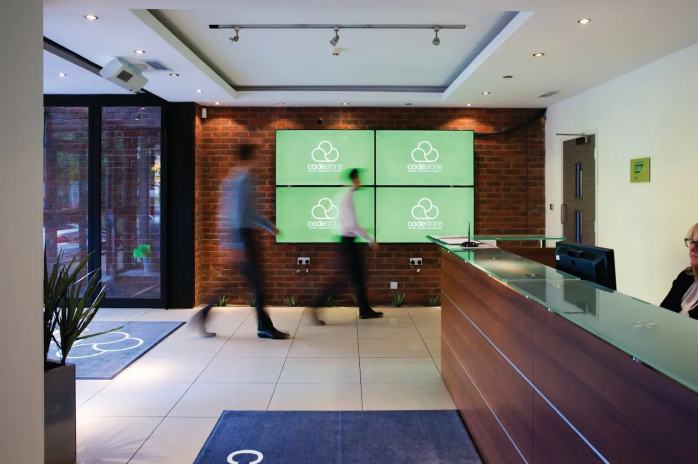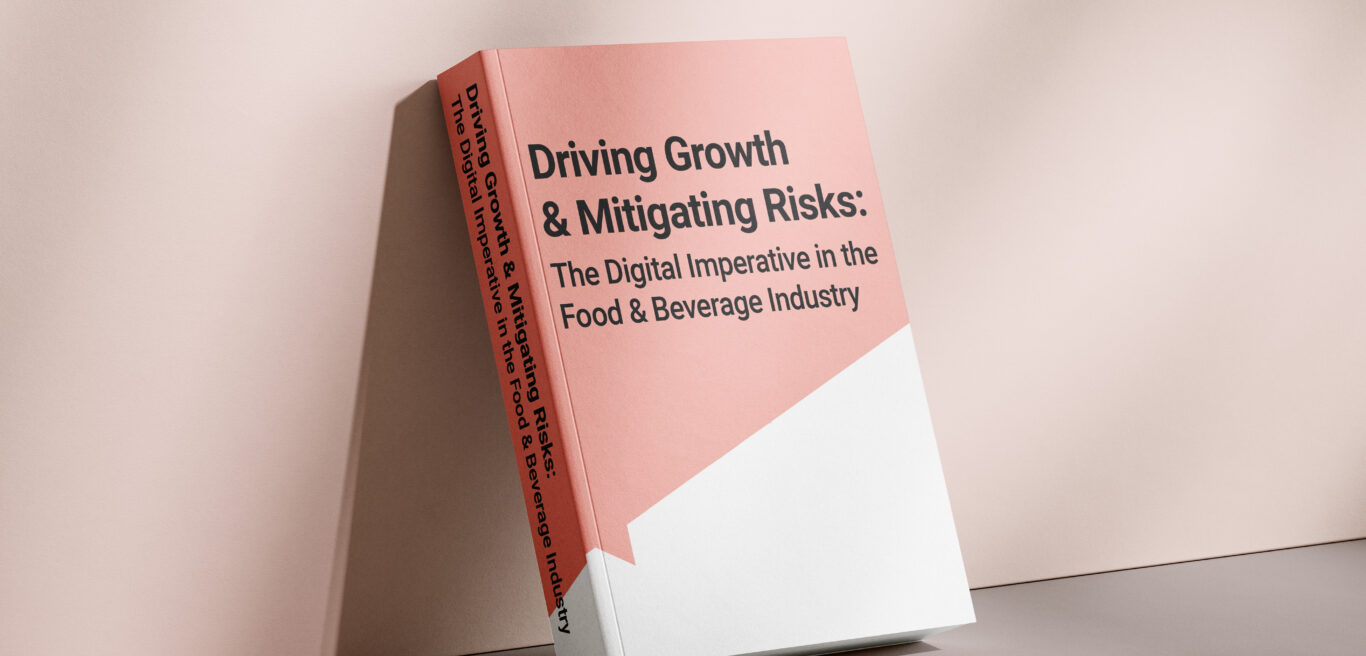The Digital Revolution in Food & Beverage: A Strategic Imperative
In today’s fast-paced business world, the Food & Beverage (F&B) industry is facing both exciting opportunities and daunting challenges. As a leader in a F&B company, your focus is likely on sustaining growth, outpacing competitors, and managing financial and technological risks. The key to success? Embracing digital transformation – a complete rethinking of how your business operates in the modern age.
Understanding the Drivers of Digital Transformation in F&B
The F&B sector is in the midst of a major shift, propelled by evolving consumer tastes, tighter regulations, and technological breakthroughs. To thrive in this dynamic landscape, companies need to harness cutting-edge tech across their entire operation. It’s not just about new gadgets; it’s about reshaping your business model to meet the demands of the digital era.
What’s driving this change? Consumers want more transparency and traceability. Nimble startups are shaking up the market. Regulations and food safety standards are getting stricter. There’s constant pressure to boost efficiency and cut costs. And data-driven decision-making is becoming essential. As a leader, you’re tasked with navigating these challenges while fostering growth and staying competitive.
Leveraging ERP Systems for Competitive Advantage in F&B
So, how can you use technology to gain an edge? Let’s start with the cornerstone of digital transformation: Enterprise Resource Planning (ERP) systems. A robust ERP solution tailored for the F&B industry is crucial. Modern ERPs offer comprehensive supply chain visibility, letting you track ingredients from source to plate, ensuring quality and compliance. They provide real-time inventory management, optimising stock levels, reducing waste, and improving cash flow. They streamline financial processes and offer accurate insights. They enhance production planning and scheduling, boosting efficiency and reducing downtime. Plus, they help ensure you’re meeting food safety standards and regulatory requirements.
By centralising data and automating key processes, ERPs give you a single source of truth, enabling smarter decisions and more efficient operations. This bird’s-eye view is vital for spotting areas for improvement and driving strategic growth.
Empowering Strategic Growth with Enterprise Performance Management
Speaking of strategic growth, Enterprise Performance Management (EPM) solutions are another vital tool in your digital arsenal. To stay ahead, you need more than just operational efficiency – you need a strategic approach to performance. EPM solutions help you set and track key performance indicators (KPIs), aligning your entire organisation around crucial metrics. They enable scenario planning, letting you model different business situations and prepare for market shifts. They streamline budgeting and forecasting, improving financial planning accuracy and flexibility. And they offer deep insights into business performance, helping you spot growth opportunities.
With EPM, you can shift from reactive management to proactive strategy execution, driving sustainable growth in a competitive market. This forward-thinking approach is crucial for F&B companies looking to innovate and expand in a rapidly changing industry.
Harnessing the Power of Data Analytics in F&B
In the F&B industry, data is a goldmine waiting to be tapped. Advanced analytics and Business Intelligence (BI) tools can help you unlock its power, turning raw information into actionable insights. These tools help you predict consumer trends, allowing you to anticipate changes in customer preferences and adapt your offerings accordingly. You can fine-tune pricing strategies to maximise profitability. Better demand forecasting helps reduce inventory costs and stockouts. Perhaps most importantly, you can enhance product development by leveraging consumer insights to create innovative, market-driven products.
By harnessing data, you can make informed decisions that drive revenue growth and market share. In an industry where consumer tastes can change rapidly, this level of insight is invaluable for staying ahead of the curve.
Let’s look at a couple of real-world examples:
Starbucks and Location-Based Decision-Making:
Starbucks leverages big data analytics to optimise its store locations and menu offerings. By analysing demographic data, foot traffic patterns, and local preferences, Starbucks can strategically place stores and tailor menu items to suit the tastes of specific regions. This data-driven decision-making has helped Starbucks expand successfully and maintain a strong global presence.
PepsiCo and Demand Forecasting:
PepsiCo utilises big data analytics to forecast demand for its products accurately. By analysing historical sales data, weather patterns, social media trends, and other variables, PepsiCo can anticipate changes in demand and adjust its production and distribution accordingly. This has enabled them to optimise inventory levels, reduce stockouts, and minimise excess inventory.
The Future of F&B: AI and Machine Learning Technologies
Looking to the future of F&B, Artificial Intelligence (AI) and Machine Learning (ML) are emerging as game-changers. These technologies are revolutionising various aspects of F&B operations. AI-powered predictive maintenance can reduce equipment downtime and cut maintenance costs, keeping your production lines running smoothly. Computer vision systems can enhance quality control, spotting defects in products or packaging with superhuman accuracy. Smart algorithms can optimise supply chains, improving logistics efficiency and reducing transportation costs – crucial in an industry with tight margins. On the customer side, AI enables personalised marketing, letting you deliver targeted promotions and recommendations based on individual preferences and behaviour.
Investing in AI and ML can give your company a significant edge, driving innovation and efficiency across your entire operation. As these technologies evolve, early adopters in the F&B industry stand to gain the most.
Mitigating Risks in the Digital Age: Cybersecurity and Managed Services
While digital transformation offers huge opportunities, it also brings new risks that need careful management. As your operations become increasingly digital, cybersecurity becomes crucial. You need to protect sensitive customer data and proprietary recipes, shield your IT infrastructure from cyber threats, ensure compliance with data protection regulations like GDPR, and educate staff on cybersecurity best practices. Investing in robust cybersecurity measures is essential to protect your brand reputation and avoid costly data breaches.
To minimise tech risks and ensure smooth operations, consider partnering with a managed services provider. Such a partnership can offer round-the-clock IT support to minimise downtime and quickly resolve issues, proactive monitoring to spot and address potential problems before they impact operations, regular updates and maintenance to keep your systems secure and up-to-date, and scalability to easily adapt your IT infrastructure as your business grows. By outsourcing IT management, you can focus on your core business while ensuring your tech infrastructure remains robust and reliable.
The Codestone Advantage: Your Partner in F&B Digital Transformation
Navigating the complex world of digital transformation requires expertise and experience. This is where partnering with a technology leader like Codestone can make all the difference. Codestone offers a comprehensive suite of solutions tailored to the F&B industry, including business technology and data strategy advisory, ERP implementation and optimisation, EPM consulting and implementation, cybersecurity services, managed services, data & insights, and AI and ML consulting. Our industry expertise ensures you’re implementing solutions tailored to F&B processes and regulations, with guidance on compliance and innovation planning.
Driving Cultural Change: The Human Element of Digital Transformation
While technology is at the heart of digital transformation, success ultimately depends on your people. As a leader, you’re well-positioned to drive the cultural change necessary for digital transformation success. Foster a culture of innovation by encouraging experimentation and calculated risk-taking, rewarding creative ideas and cross-functional collaboration, and investing in ongoing learning and skill development for your team. Promote data-driven decision making by making data accessible across all departments, training employees on data analysis and interpretation, and using insights to inform strategic decisions at all levels of the organisation.
Emphasise agility and adaptability by implementing flexible methodologies in project management and product development, encouraging quick responses to market changes, and breaking down silos to promote cross-functional teams. Prioritise customer-centricity by using digital tools to gather and act on customer feedback, empowering employees to make customer-focused decisions, and leveraging data to personalise customer experiences. By focusing on these cultural aspects alongside technological implementation, you can ensure a holistic and sustainable digital transformation.
Challenges and Opportunities in F&B Digital Transformation
While the benefits of digital transformation are clear, it’s important to acknowledge the challenges that F&B companies may face on this journey:
- Legacy Systems and Infrastructure: Many F&B companies still operate on outdated systems, making it difficult to integrate new technologies. For instance, a pizza chain might struggle to implement online ordering due to incompatibility with legacy point-of-sale systems.
- Data Privacy and Security: With increasing cyber threats, protecting sensitive data like customer information and proprietary recipes is crucial. A data breach can severely damage customer trust and lead to regulatory consequences.
- Resistance to Change: Employees may be hesitant to adopt new technologies, fearing job disruptions. Clear communication and change management strategies are essential.
- Skills Gap: Implementing digital technologies requires a workforce with the right skills. F&B companies may need to invest in training or new talent acquisition.
- Regulatory Compliance: Ensuring digital solutions comply with food safety, labelling, and traceability regulations can be complex.
Despite these challenges, digital transformation offers numerous opportunities – here’s just four but we’ve got more to share so get in contact with us at the link below!
- Enhanced Customer Engagement: Digital technologies enable real-time, personalised customer interactions, fostering stronger relationships.
- Data-Driven Decision Making: Access to rich data empowers F&B companies to make informed decisions and identify new market opportunities.
- Improved Supply Chain Management: Digital tools provide end-to-end visibility, enabling better inventory management and reduced waste.
- Efficient Operations: Automation can optimise operations, reduce errors, and decrease production costs.
By strategically addressing the challenges and capitalising on these opportunities, F&B companies can position themselves for success in the digital age.
Measuring Success: KPIs for Digital Transformation in F&B
To ensure your digital transformation efforts are delivering results, it’s crucial to track key performance indicators (KPIs) that align with your strategic objectives. Consider monitoring metrics related to operational efficiency (such as Overall Equipment Effectiveness, inventory turnover rate, production cycle time, and waste reduction), financial performance (including gross margin improvement, Return on Investment for digital initiatives, cost savings from process automation, and revenue growth from new digital channels), customer experience (Net Promoter Score, customer retention rate, digital engagement metrics, and time to resolution for customer issues), innovation and growth (new product development cycle time, percentage of revenue from new products, number of successful AI/ML implementations, and time-to-market for new offerings), and risk management (cybersecurity incident response time, compliance audit success rate, downtime reduction, and data breach prevention rate).
By regularly tracking and analysing these KPIs, you can demonstrate the tangible impact of your digital transformation efforts and make data-driven decisions to refine your strategy. This approach allows you to continuously improve your digital initiatives and ensure they’re delivering real value to your business.
Conclusion: Seize the Digital Future of Food & Beverage
As a leader in the F&B industry, you’re at the forefront of a digital revolution that will reshape the sector for years to come. By embracing digital transformation and partnering with trusted business technology services innovators like Codestone, you can drive sustainable growth through operational efficiency and innovation, stay ahead of the competition by leveraging data-driven insights, mitigate financial and technological risks with robust security measures, empower your workforce with cutting-edge tools and skills, and deliver exceptional customer experiences that build brand loyalty.
The time to act is now.
Don’t let your company fall behind in the digital race. Embrace the power of technology and position your organisation for long-term success in the dynamic world of Food & Beverage.
Your business’s future depends on your ability to adapt, innovate, and leverage technology to its fullest potential.
With the right strategy, tools, and partners, you can navigate the challenges of digital transformation and emerge as a leader in the industry.
The question isn’t whether you can afford to invest in digital transformation – it’s whether you can afford not to.








































































